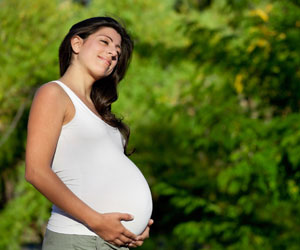Traveling during pregnancy is usually as safe as traveling when you’re not pregnant, but…
There are some potential risks to weigh for you and your growing family. The official medical statement is that in the absence of known complications (such as a risk for pre-term delivery, like with twins, or existing respiratory or heart disease), pregnant women are good to go (I may have ad-libbed a bit there).
The fine print also notes that in frequent flyers, the risks to babies from exposure to radiation may be higher, but the main, grounded research is that you just shouldn’t travel for a cumulative total of more than 150 hours while pregnant. The more obscure but notable risks of traveling while pregnant may include preterm birth or unforeseen emergencies such as bleeding complications. And if you’re traveling to an area that requires specific vaccinations or medications, risks and benefits should be carefully weighed.
During pregnancy you also have an increased tendency toward blood clotting, and if you’re continuing on any hormone therapy from assisted reproductive interventions, you may be at higher risk as well—beyond the already tenfold increase in the risk during pregnancy of a blood clot.
Cabin pressure and immobility while flying can be major contributors to this possibility. So, ladies, if you must fly, wear your support hose and walk around as much as possible.
The best time to travel
If you have a choice in the matter, it’s best to plan any necessary air travel for your second trimester. Risks of preterm birth are minimized after twenty weeks, and after thirty-six weeks most airlines won’t let you on a plane anyway.
The way I figure it, knowing that there are some risks, I think it warrants serious evaluation as to whether to fly at all during this important time (especially during the first trimester). Perhaps planning a babymoon via road trip may just suit you fine.
If you are going to fly, consider these pregnancy-safe foods and supplements to counteract in-flight radiation exposure:
Food and supplements to add in along the way
Supplements to add to your prenatal:
- Calcium 1,000 mg
- Magnesium 500 mg
- Vitamin C with bioflavanoids 2 to 5 grams
- Vitamin E d-alpha-tocopherol about 900 IU per day
Foods
- Olive Oil: Cold-pressed olive oil (extra virgin olive oil is better for you) helps protect the cell membranes from radiation.
- Chlorophyll-rich foods including alfalfa sprouts, celery, leafy greens, parsley, spirulina and chlorella (two micro-algae products), and wheatgrass help the liver detoxify in a way that’s safe during pregnancy.
- Seaweeds such as dulse, kombu, nori, and wakame (or powdered in capsules as a supplement) are a known food to offset radiation exposure.
- Miso has also been shown to help combat radiation exposure.
- Selenium-rich foods such as probiotic-rich yogurt, protects DNA from radiation damage.
- Other foods that help the body decrease the effects of radiation include apples, beets, broccoli, Brussels sprouts, cabbage, garlic, guavas, kale, nutritional yeast, onions, oranges, pineapple, plums and watercress.
In short, my advice to you when traveling while pregnant is:
- Sport the support hose.
- Have a shot of wheatgrass and liberally use cold-pressed olive oil.
- Take a bolstered vitamin regimen throughout your trip.
- Enjoy gallivanting without a stroller while you still can!
